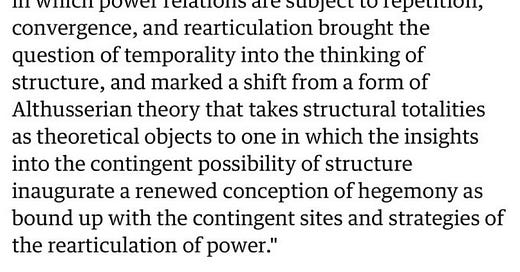Gobbledegook In Academia: Judith Butler & The Sokal Hoax
An Essay Questioning the Methodology and Outlook of Critical Theory
I was still a young child in 1996 when Alan Sokal submitted a deliberately nonsensical paper titled “Transgressing the Boundaries: Towards a Transformative Hermeneutics of Quantum Gravity” to the cultural studies journal Social Text.
The paper was filled with jargon-heavy language and absurd claims, designed to parody postmodern academic writing—especially in critical theory and cultural studies.
When I was eighteen, I entered a British university to study English Literature, excited at the prospect of doing work on a subject I had become enthusiastic about by reading and writing. I was a science fiction and fantasy reader, having consumed a lot of cyberpunk, New Weird, space opera, and so forth. I think my favourite writers were Arthur C. Clarke, Philip K. Dick, Tad Williams, China Mieville, Octavia Butler, although I also enjoyed the work of some of the writers I had read during my A-Level English classes, including Ted Hughes, Sylvia Plath, Seamus Heaney, Jean Rhys, TS Elliot, and of course Shakespeare. At that stage, I think I wanted to become some kind of writer, although I didn’t have any particular specialisation. I liked a lot of lyrics in music, such as those of Jimi Hendrix, Syd Barrett, Thom Yorke.
It started to become clear that I had entered a wasteland when I spent my first year wading through critical theory—Baudrillard, Derrida, Lacan, Barthes, Butler, etc—that seemed strangely nonsensical and vacuous. At first, I think I thought that we were learning tools to deconstruct the world, or that may have been how the topic was presented to us. But the more I read and wrote and thought about critical theory the more it seemed like it was a pseudo-language meant above all else to make critical theorists sound smart and sophisticated. It was like an armour of impenetrable jargon for academics in these topics to say: “look, we are doing important work here. If you don’t understand it that’s on you, not us.”
I was reminded of this today when I saw this bizarre quote from Judith Butler on X:
More or less, Butler is talking about how power and specifically capitalist power is highly adaptable and not static. Well, duh. Why would it not be? Of course power is flexible and adaptable—otherwise, how would it be kept or grown? That’s actually just a feature of how power works. Power not only adapts and rearticulates itself around changing circumstances, but also around social phenomena, like the rise of new generations of people, or long term technological or geopolitical trends like the rise and fall of empires.
But it’s just so annoying and obscurantist to hide that expression or any expression behind this bizarre veil of mumbo jumbo.
Surely the point of analysis is to give people tools to understand the world, and act within the world? Critical theory is a set of vague hand motions more than anything much else.
My pathway through life took an unexpected turn. Due to changing personal circumstances, I didn’t complete my degree in English Literature, and instead I dropped out and spent my time composing music. I didn’t want to return to critical theory, of course. When I returned to studying, I taught myself the history of economics. Eventually, after several years of learning to code and other technical skills, I graduated with a degree in data science.
So I didn’t learn about the Sokal Hoax until a few years after my first exposure to critical theory. But when I learned about it, I smiled. It made perfect sense. The trajectory of critical theory was not about making sense of the world. It was a scam, a pretension at analysis, and in its own way a power grab. These pseudo-intellectuals were taking over academic stations for their own betterment, at the financial cost of the wider society, but moreover at the cost of better and clearer ways of thinking and doing analysis. Of course, plenty of academic study today is valuable financially, morally, and scientifically. But plenty of it is also gobbledegook and pseudo-intellectual mumbo jumbo.
I propose a test for all academics: if you are serious about your analysis, you need to be able to explain it in clear words for a non-technical and non-academic audience. What it does, and why it is important. That should not be very hard in the wider scale of things. And to be clear, I’m not against experimentation or avant garde applications. In fact, the benefits of experiments and novel ways of thinking are very clear. But at very least, if you’re pursuing a novel approach, you should be able to explain what it is that you’re pursuing.
Do you think many critical theorists could pass this test without resorting to condescension?




